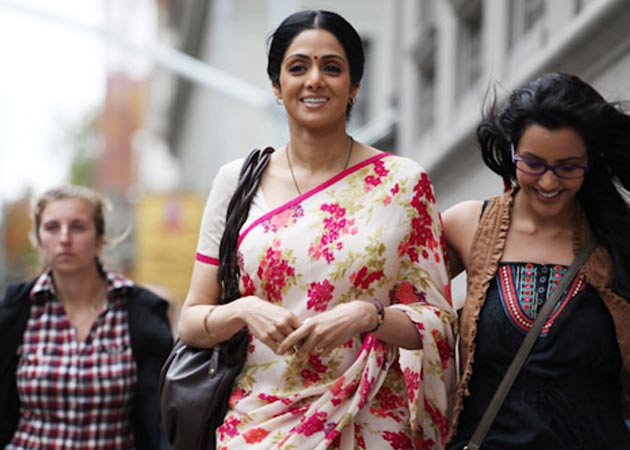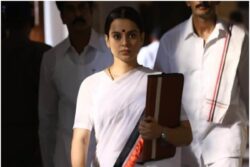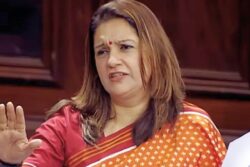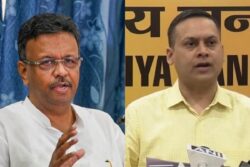Movie Review: English Vinglish

Cast:Sridevi, Adil Hussain, Priya Anand, Mehdi Nebbou
Director: Gauri Shinde
The protagonist of English Vinglish stumbles upon a word she has never heard before – judgmental. She runs to her niece and asks: does it mean ‘mental’ judge? No, the girl tells her, it means jumping to damning conclusions about a person on the basis of flimsy evidence.
That is precisely what Ms Shashi Godbole (Sridevi), Pune-based mother of two, is constantly subjected to by her corporate executive-husband, Satish (Adil Hussain), and her school-going daughter.
That, crucially, is also what debutante director Gauri Shinde’s well-meaning screenplay unwittingly heaps on the rather simplistically etched central character.
This film hinges on an idea that only reinforces the phony notion that a woman, no matter how gifted, must speak fluent English in order to truly assert herself.
Tame superficiality is indeed the biggest bane of English Vinglish, which, for the most part, is otherwise reasonably watchable, especially owing to a charming performance by Sridevi, back on the big screen after a 15-year hiatus.
A star is reborn and one wants to fall in love with her all over again. But despite the temptation, it is eventually too docile an affair to send the heart pounding and the pulse racing.
English Vinglish, for all its surface gloss and clean family entertainer aspirations, doesn’t possess that little something needed to turn a one-dimensional account of the makeover of an unassuming homemaker into a convincing, universal drama about a woman’s empowerment.
It is a shallow tale of a self-effacing woman who begins to discover herself only when she flies to New York for a niece’s wedding and enrolls in an English language crash course to rid of what her hubby and children perceive as her one great drawback.
Although it is impressively crafted, crisply edited and generally well-acted, English Vinglish hobbles along on the crutches of all manner of stereotypes.
The husband isn’t an insensitive ogre but that doesn’t stop him from declaring that Shashi is “born to make laddoos”.
The lady’s school-going daughter is a bright kid by all accounts but she loses no opportunity to ridicule her mother.
Come off it girl, this is 2012. A lady who makes the best laddoos in town and runs a thriving catering business from home would surely need no endorsement of her self-worth in this day and age.
Couldn’t she have just got up and gone to a friendly neighbourhood teaching shop to pick up functional English? And even if she didn’t, why should it have really mattered to her?
That is the problem with English Vinglish – it rests on an anachronistic hypothesis that is both overly facile and contrived.
Moreover, the film fails to create the Marathi ambiance that would have added a significant layer to the narrative.
Barring snatches of a wedding song towards the end of the film, the cultural moorings of English Vinglish remain indeterminate.
To make matters worse, the writing turns rather cheesy at times. “How will you manage in the US without knowing English,” a visa officer asks Shashi. An Indian co-worker in the US consulate wisecracks: “Like you manage in this country without knowing Hindi.” Tit for tat. Mild applause.
Upon his arrival in the US, a garrulous co-passenger of Shashi (played by Amitabh Bachchan) is asked at the immigration checkpoint: “What is the purpose of your visit?” Without batting an eyelid, he shoots back that he is in the country to spend some dollars to help the American economy recover.
The message is loud and clear: don’t mess with an Indian, especially if it happens to the Big Baritone himself. Some more applause.
An impolite Black woman is Shashi’s first brush with America. She is a barista who batters Shashi with questions at an NYC coffee shop: Still or sparkling? Americano, cappuccino or latte? Bagel, sub or sandwich? Poor Shashi is lost for words. “You’re holding up my line, lady,” the woman yelps. Shashi breaks down.
Some of the banter in the English class conducted by a gay teacher is mildly funny. But here, too, the film offers a slew of stereotypes right out of Mind Your Language: a handsome and impossibly romantic Gallic cook, a Chinese beauty salon girl, a cheerful Pakistani cabbie, an idli-obsessed south Indian techie, a Mexican nanny… and a reticent African who, when he does open his mouth after much prodding, lets on that he too is gay.
The Frenchman, Laurent (Mehdi Nebbou), develops a bond with Shashi, owns up to his feelings for her and asks her out for coffee several times but in vain. She is a chaste Bharatiya nari, a model mother and a dutiful wife who will never betray her family no matter how much of a doormat she may have been reduced to.
The film has a clutch of fine performances. Both Adil Hussain and Mehdi Nebbou, despite their sketchily written roles, are solid. Priya Anand as the niece turns in a noteworthy performance. But it is Sridevi who is obviously the soul of English Vinglish.
Her hesitant but heartfelt climactic speech, delivered undemonstratively, is the high point. But it takes two hours too long in coming. Chances are that by then you might cease to really care about her newly acquired spoken English skills.
If you don’t, you might actually feel a little lump in your throat. That is the kind of film English Vinglish is. It would work strictly for those who can discount the film’s oversimplified worldview.









